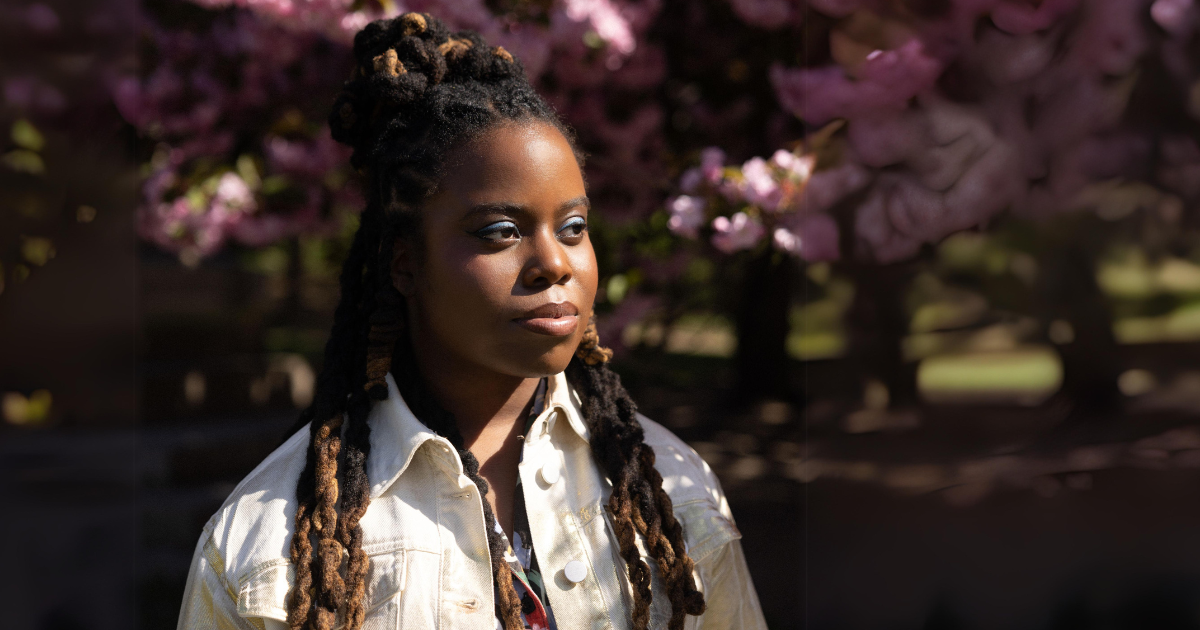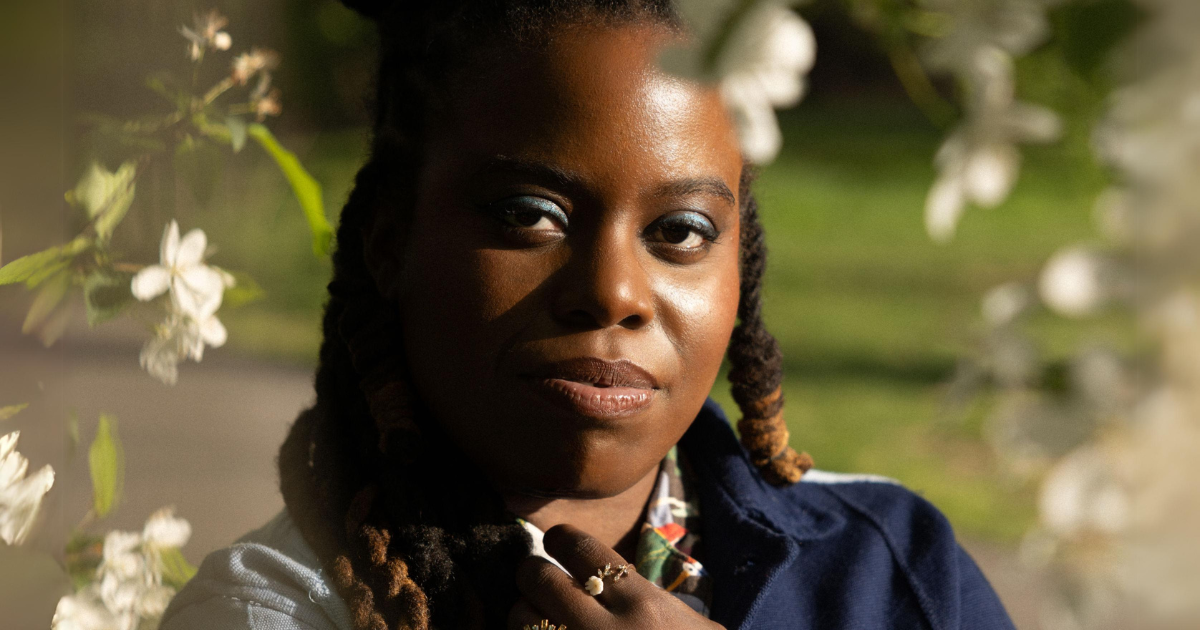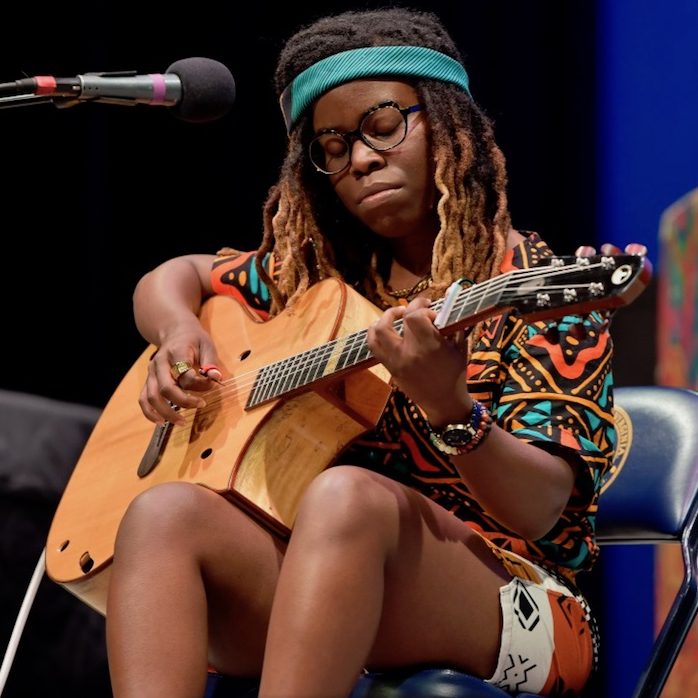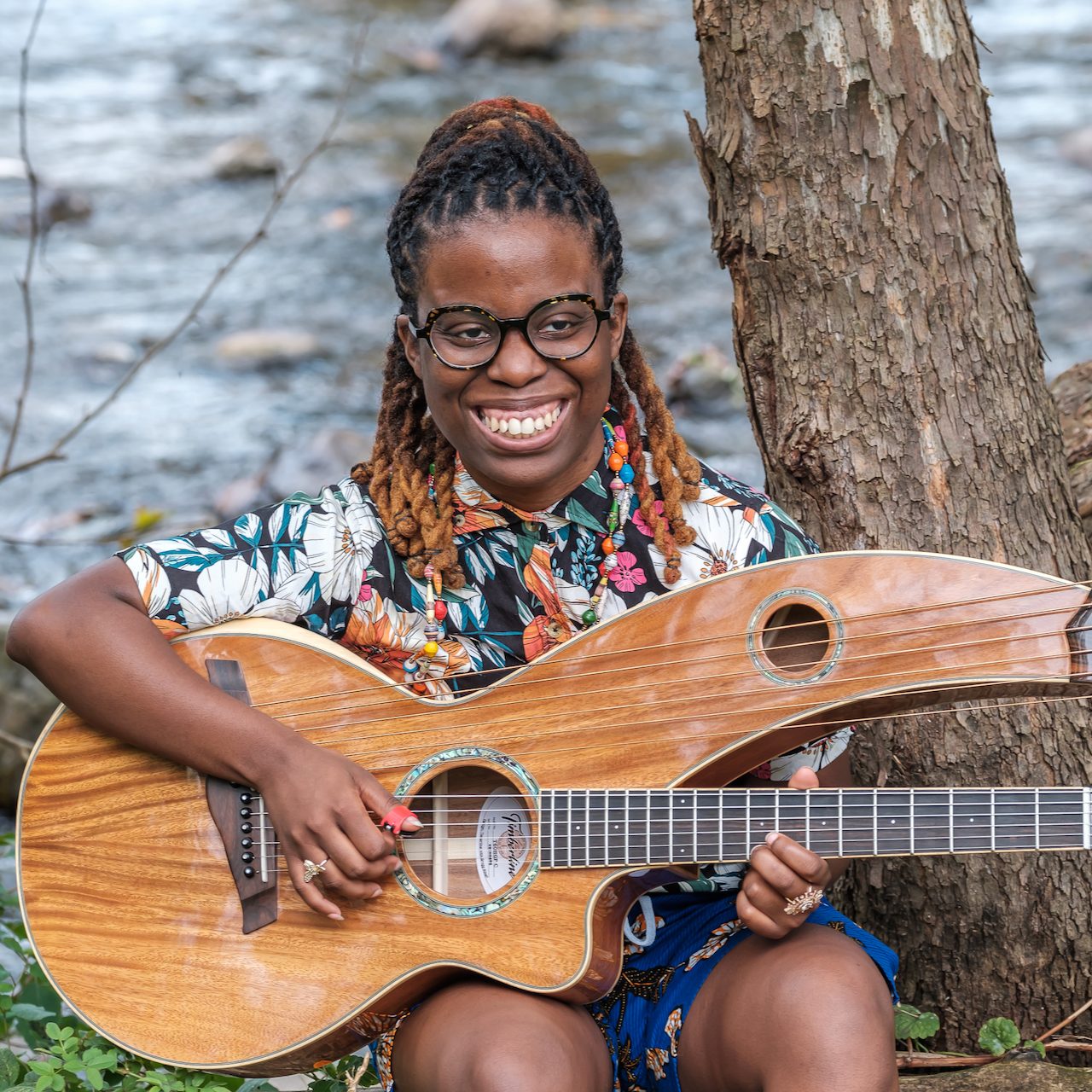Oscar Wilde said, “If a thing is worth doing, it is worth doing well. If it is worth having, it is worth waiting for. If it is worth attaining, it is worth fighting for. If it is worth experiencing, it is worth putting aside time for.”
Composer and guitarist Yasmin Williams can certainly relate to the sentiments in Wilde’s reflection. Williams – who went from New York University in 2017 to releasing her first LP in 2018 to performing across the world – says when she picked up the acoustic guitar, it was about “trying to become the best guitarist [she] could be.”
Though a straightforward aspiration, and one that Williams has pursued fervently between the release of her debut album and now of her third record, Acadia, Williams has lived through ups, downs, and unknowns of the music industry, which have shifted her goals along the way. Particularly between 2020 and 2024, when Williams wrote the songs that would become Acadia, the inherent nature of public visibility and the process of establishing herself in the music landscape led Williams to discern what exactly is worth doing, having, waiting for, attaining, fighting for, and experiencing as a musician. It’s this amalgamation of inner realizations and external escapades that make Acadia the compelling journey it is.
Listening to each piece is like exploring a miniature world. Songs like album opener “Cliffwalk” unlock the door to an event memorable to Williams and all the emotions that came with it – performing at Newport Folk Festival and writing most of the song the night before, with the rest unfolding as an improvisation on stage. Pieces like “Virga” and “Dream Lake” reflect the duality of positive and negative challenges that come with nurturing a career as a musician. The two tracks are fittingly written with this direct connection to the other in mind.
Acadia as a whole is brimming with collaboration, a potpourri of artists, instruments, and culture, songs like “Harvest,” “Hummingbird,” and “Dawning” speak directly to what can grow from embracing new friendships, communities, and the unique creative resonance that can be found therein.
Acadia may encompass a fixed window of time in her life, but much like the many meanings of its title and Williams’ own ethos for the album – a place of peace, a place where creativity can blossom – the project endures as an oasis, a reminder from the past thriving in the present that scatters new seeds for music in the future, as Williams continues to walk down a trail of her own design.
Speaking with BGS by phone before a tour that will take her across the U.S. and to the UK later this year, Williams talked about the value of empowerment and patience, the expectations of the music industry, insights that came from producing her own music, and more.
What was the evolution of your vision for Acadia like and how did things develop as you met new artists and had so many new experiences from 2020 to 2024?
Yasmin Williams: I wasn’t really envisioning the album being as expansive as it is. Back in 2020 and even before that, I was still focused on just trying to become the best guitarist I can be, trying to become more confident in my playing and more confident in my abilities.
When I played Newport Folk Festival [in 2021], it gave me the confidence and the encouragement that I needed to realize that I can actually do this for a living – be a professional musician. It definitely lit a spark and after that, I realized I should take meeting people more seriously. Not necessarily networking, but just trying to make friends with musicians that I’m meeting at these festivals since I keep seeing the same people. That’s kind of how the collaborations came about: Just me being not afraid to tell people, “Hey, I really like your music. I’d love to do something with you,” or people telling me that and me not being afraid to follow up with them because, I guess I dealt with some sort of– I don’t want to say, “inferiority complex,” but like, I feel like the musicians that are on the record have been doing their thing for long time. I’d be afraid to reach out to people and ask them to collaborate with me.
After 2021, I got over that fear, which helped immensely. That led to the collaborations and that led to me thinking, “My next record can be what I want it to be but, I can also invite people to do things that I cannot do.” Like, I don’t play saxophone, I don’t play drums. I’m not super comfortable singing on my music yet and inviting all of these people to do those things really created the atmosphere and the universe that I wanted for Acadia. I wanted it to be something that my other two records aren’t necessarily, which is a more expansive kind of universe.
How did you approach conveying themes, motifs, or emotions when writing music to include others versus writing for yourself?
Every song was different. As far as [asking myself], “How does this person fit into the theme or the emotion that I’m trying to present?” What I did was, I told the collaborator, “Here’s what emotion or mood I’m trying to evoke here. Does this make sense to you? Do you think you can do this? Let’s figure out a way to do it.” I gave them slightly free reign, but help if they needed help figuring something out.
Where does your dedication to informing folks about the social and historical aspects of music, and the prospect of personal responsibility around that, fit within your music career?
It took me years to figure out if I even wanted to be involved in making people aware of the historical aspects of the music that I was playing. I also had to learn a lot about music that I was playing and about folk music in general, because I didn’t really grow up listening to folk music at all or bluegrass or things like that. So I’ve learned a lot in the last five, six, seven years.
Things changed when I finished [my album] Urban Driftwood. Just remembering, going to protests up here in Washington, D.C. when George Floyd’s murder happened and seeing all of the political unrest and social unrest around here where I live, and obviously seeing it on the news everywhere else definitely made me change my mind. As far as being open about, for example, speaking about being a Black female guitarist, which is not something I really wanted to do in my late teens, early 20s. I definitely came around to it and now see it as a necessity.
To me, social media is a great tool to try to help educate folks, because there’s so much online at our fingertips that’s just factually incorrect. Anything I can do to try to help mitigate that, I think is good. I think it’s important for me now to be involved in the full scene in a way that’s positive and educating people – to just get involved in things or be involved in ways that I’m interested in. I’ve always been a history nerd anyway so to me, it makes sense now to do that, whereas before, I guess I just wasn’t mature enough to understand why I would have to be a musician and educate folks and have a social media presence. But now I don’t have a problem at all.
What would you describe as the most challenging aspect of making Acadia and how did you wade through that experience?
Figuring out how to finish some of the songs. I realized I have to let time pass and let it come to me. “Sisters,” for example, I came up with that melody like, two, three years ago now? And it was stuck being a two-, three-minute song for years. I thought, “This doesn’t feel done.” But I couldn’t come up with anything. Then, the night before my recording session, I came up with four extra minutes of material. For me, I can’t force the issue of finishing a song. It just kind of has to come to me. And whenever it comes, it comes. And these songs, some of them took a really long time to get finished. So that was probably the most difficult part of it.
What was the most interesting new musical technique or process you explored while making Acadia and why was it so meaningful?
Producing was the most interesting part of it; hearing what people heard in my music was by far the most interesting aspect of recording. Just hearing how people process it, then hearing what they do in response. Pretty much everyone grasped what I was trying to accomplish in the song that they’re featured on.
For example, “Hummingbird” with Allison de Groot and Tatiana Hargreaves. They both come from a more, I guess, old-time tradition, which is very different than [the kind of song] “Hummingbird” is. It took a little while for us to kind of get the song in the studio, because the song is very difficult, first of all, to play. But they absolutely nailed it. Hearing how they heard the timing and the syncopation and the melody, and the melodic aspects of the song, and how they thought, “Okay, I can fit in here and drop out here and harmonize here,” it was really interesting to see how people’s brains worked and how it’s so different from how mine works but it somehow fits together pretty seamlessly.
How did you discern your feelings when a collaborator might encourage you to try something new, versus deciding to stay true to yourself and your voice as a composer and musician?
I feel like I was more so bringing the collaborators to a different place that maybe they weren’t used to and pretty much everybody who’s on the record was willing to do that and go to somewhere new.
Once the recording process and collaboration process got started, it was really easy for me to just tell people, “Okay, I want this, this, and this.” And most of the time, people are just like, “Yeah!” With Darlingside and the song “Virga,” I made it clear that I actually wanted them to do lyrics and then we worked on that. They were open to it for the most part so for me it was easy. But maybe for some of the collaborators it was about getting them out of their usual music making mode and into a more open-minded mode.
Being ready to make an album like this, it took living life and having different experiences.
(Editor’s Note: Continue exploring our Artist of the Month coverage of Yasmin Williams here.)
Photo Credit: Ebru Yildiz



